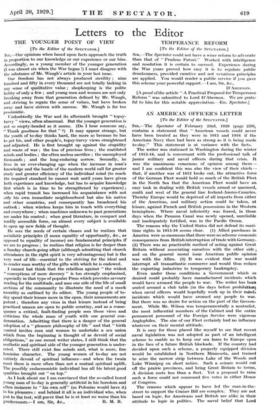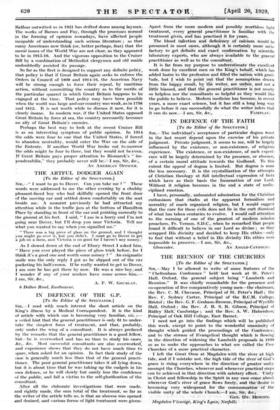AN AMERICAN OFFICER'S LETTER [To the Editor of the SPECTATOR.]
81E2—The Spectator of February 23rd, 1929 (page 259), contains a statement that " American vessels could never have been treated as they were in 1915 and 1916 if the American Navy then had been as strong as it is being made to-day." This statement is at variance with the facts.
The writer was stationed in Washington during the winter of 1915-16, and is conversant with the professional talk of junior military and naval officers during that crisis. It was the unanimous consensus of opinion among them— and I am confident this was also the view of their chiefs— that, if another war of 1812 broke out, the attractive force of the German Fleet would hold so much of the British Fleet in the North Sea that the American Fleet would have an easy task in dealing with British vessels armed or unarmed, south and west of the general line Iceland-Azores-Canaries. Thereby Europe would be deprived of all imports from either of the Americas, and military action could be taken, at leisure, against French and British possessions in the Western hemisphere. Where naval inferiority was feared, in those days when the Panama Canal was newly opened, unreliable and inadequately fortified, was in the Pacific Ocean.
The reasons why the United States did not defend its mari- time rights in 1915-16 seems clear. (1) Allied purchases in America were so enormous that there were no adverse economic, consequences from British interruption of trade with Germany. (2) There was no practicable method of acting against Great Britain without associating ourselves with the other side ; and on the general moral issue American public opinion was with the Allies. (3) It was evident that war would interrupt all transatlantic commerce and would thus reduce the exporting industries to temporary bankruptcy.
Even under these conditions a Government which so desired could probably have manufactured incidents which would have aroused the people to war. The writer has been seated around a club table (in the days before prohibition) when naval• officers would hopefully work up in their minds incidents which would have amused any people to war. But there was no desire for action on the part of the Govern- ment. While Mr. Wilson was temperamentally a neutralist, the most influential members of the Cabinet and the entire permanent personnel of the Foreign Service were vigorous Anglophiles. The size of our Fleet certainly had no influence whatever on their mental attitude.
It is easy for those placed like myself to see that recent naval legislation was not adopted as part of an intelligent scheme to enable us to keep our sea lanes to Europe open in the face of a future British blockade. If the country bad decided upon such a scheme, a properly equipped division would be established in Northern Minnesota, and trained to seize the narrow strip between Lake of the Woods and Lake Winnipeg on short notice. Such a seizure would cut off the prairie provinces, and bring Great Britain to terms. A division costs less than a fleet. Yet a proposal to raise such a force could not command five votes in either House of Congress.
The reasons which appear to have led the man-in-the- street to support the Cruiser Bill are complex. They are not based on logic, for Americans and British are alike in their attitude to logic in politics. The naval belief that Lord
Balfour outwitted us in 1921 has drifted down among laymen. The works of Barnes and Fay, through the processes normal in the forming of opinion nowadays-, have affected people incapable of understanding such serious literature ; so that many Americans now think (or, better perhaps, -fear) that the moral issues of the World War are not clear, as they appeared to be in 1915-16. And the vigorous opposition to the Cruiser Bill by a combination of Methodist clergymen and old maids
undoubtedly assisted its passage. - So far as the fleet is designed to support any definite policy, that policy is that if Great Britain again seeks to enforce the Orders in Council of 1809 and 1914-16, the American Navy will be strong enough to force their repeal, by maritime action, without committing the country as to the merits of the particular quarrel in which Great Britain happens to be engaged at the time. That policy may have been possible when the world was large and our country was weak, as in 1798 and 1812. It is not worth while to discuss it now, for it is clearly insane. In modem war, if the United States opposed Great Britain by force at sea, the country necessarily becomes an ally of Great Britain's enemies. , Perhaps the best way to look at the recent Cruiser Bill is as an interesting symptom of public opinion. In 1914 the odds were four to one that the United States, if forced to abandon neutrality, would enter the War on the side 'of the Entente. If another World War broke out • to-morrow the odds might be four to three, but they would not be even. If Great Britain pays proper attention to Bismarck's " im- ponderabilia," they probably never will be.-=-I am, Sir, &e.,
AN A3LERIGAN OFFICER.

























































 Previous page
Previous page